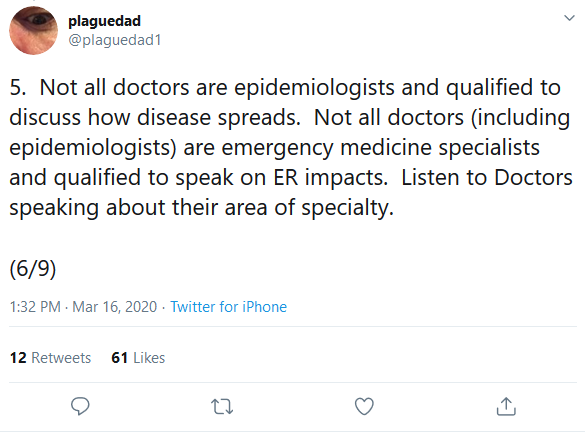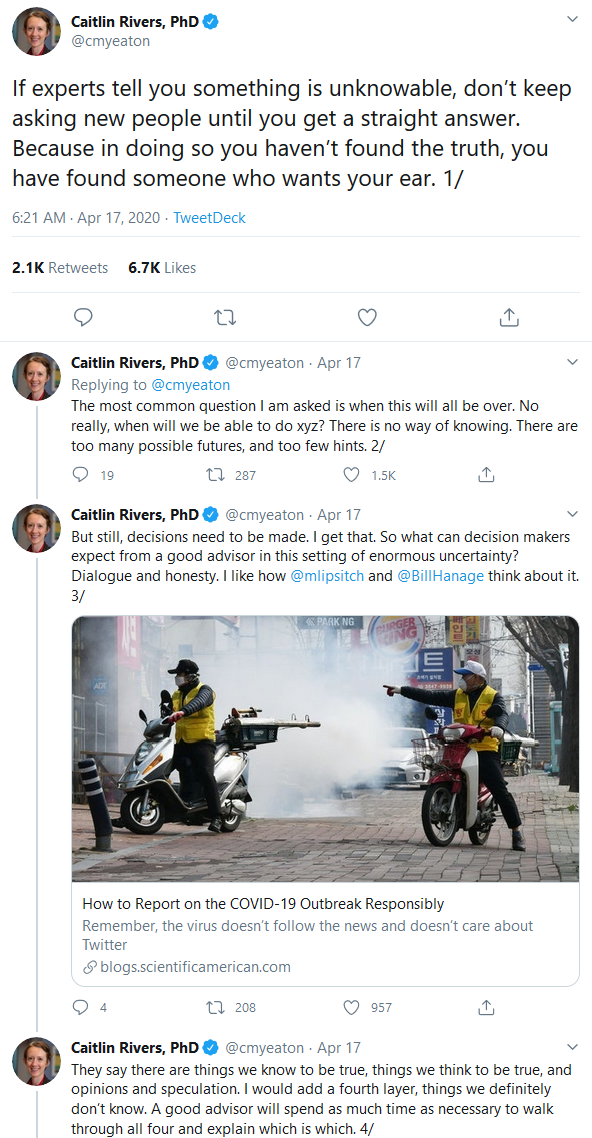COVID-19 Misinformation and Disinformation
As an example of how we make decisions when we are uncertain about the world around us, please watch this psychology experiment.
- Why do you think the participant reacts differently in the two situations?
- Have you ever acted like the participant in the second condition? Why or why not?
Misinformation and disinformation are actions which are very similar, but have an important distinction regarding the intent of the person spreading the news. Misinformation is incorrect information that is repeated and spread unknowingly, often by social media. Disinformation is incorrect information that is repeated and spread even though the person spreading the information knows the information is false.
Unreliable Doctors
Just because somebody is a doctor does not mean you should listen to what they say.
plaguedad1 – Not All Doctors Are Epidemiologists

Not all doctors are epidemiologists and qualified to discuss how disease spreads. Not all doctors (including epidemiologists) are emergency medicine specialists and qualified to speak on ER impacts. Listen to doctors speaking about their area of specialty.
For example, James Watson has a Nobel Prize for his role in the discovery of the helical structure of DNA. However, his views on race and sex are so ugly and scientifically wrong that the DNA research lab he led has disavowed his views.
What are the qualifications of the following doctors?
- Dr. Theresa Tam
- Dr. Bonnie Henry
- Dr. Deborah Birx
- Dr. Scott Atlas
- Dr. Hehmet Oz
- Dr. Drew Pinsky
- Dr. Phil McGraw
Please watch the following videos, featuring some of the above doctors:
With regard to Dr. Oz, the acceptable mortality rate at the Vancouver School Board is 0%, not the ‘2 to 3 percent’ figure that Dr. Oz thinks is acceptable. At the end of the 2018-2019 school year, I arranged field trips for a total of about 120 students to Science World, the Vancouver Aquarium, and the Vancouver Planetarium. I had to submit paperwork to ensure that the trips were safe and that there was first aid available. I’m not sure what would have happened if I had suggested that there would be a 2-3% mortality rate for the trip, so we should expect 2-4 students will die on the field trips. There definitely would have been a long discussion about my (incredibly poor) judgment and my future as a teacher.
Unreliable Politicians
Unfortunately, many politicians have spread misinformation about COVID-19. For example, a study found that about one fifth of English-language news articles spreading misinformation were about US President Donald Trump. The authoritarian President of Belarus, Alexander Lukashenko, has claimed that drinking vodka and spending time in saunas will help prevent COVID-19.
Finding True Information
In addition to the intended dishonesty of disinformation, it is important to be on the alert against misinformation. In particular, the news media will often report on scientific information in a way that sensationalizes the information, or obscures the true meaning.
Please read this article which describes how you should consume media about COVID-19, and think about the following questions:
- Do I seek out diverse sources of information about COVID-19?
- Do I doom-scroll, sharing every latest news story, or do I slow down a little?
- Do the news stories I consume describe frequent, common events, or freakish one-off accidents?
Making Decisions About Uncertain Situations
Any new disease will have a lot of uncertainty surrounding it. How is it transmitted? How dangerous is it? How can it be treated? How can it be prevented? Is it possible to make a vaccine?
Here is a good Twitter thread about this uncertainty as it applies to COVID-19. Here are some rules for consuming media related to the coronavirus.
The revolutionary medical breakthrough being breathlessly reported will probably not pan out.
The report/article/listicle you are consuming can't possibly contain 'everything' you need to know.
Filter on the byline not the headline. Consume news about science from credible science reporters, policy from credible policy reporters, etc. Do so only when their sources/coauthors are real experts.
...
Not everyone on social media is who they say they are. Don't unwittingly amplify specious rumors on the Internet.
...
Be skeptical of data originating from official sources of countries that lack a legal and cultural framework guaranteeing freedom of press and transparency in government.

Here is another thread, written on April 17, 2020, that is still very relevant today.
If experts tell you something is unknowable, don’t keep asking new people until you get a straight answer. Because in doing so you haven’t found the truth, you have found someone who wants your ear. 1/
The most common question I am asked is when this will all be over. No really, when will we be able to do xyz? There is no way of knowing. There are too many possible futures, and too few hints. 2/
But still, decisions need to be made. I get that. So what can decision makers expect from a good advisor in this setting of enormous uncertainty? Dialogue and honesty. I like how @mlipsitch and @BillHanage think about it. 3/
https://blogs.scientificamerican.com/observations/how-to-report-on-the-covid-19-outbreak-responsibly/ …They say there are things we know to be true, things we think to be true, and opinions and speculation. I would add a fourth layer, things we definitely don’t know. A good advisor will spend as much time as necessary to walk through all four and explain which is which. 4/
There is a lot in that fourth category right now. Sometimes “we don’t know” really is the answer. We have never faced COVID-19 – or any pandemic like this – in modern times. We are having to live with uncertainty in really profound ways. It’s hard. 5/5

Please watch the following video, which describes how to make decisions under uncertain conditions. As you watch the video, think about how you could use the results of the hotel towel study to help increase vaccination rates among new parents in Vancouver.
